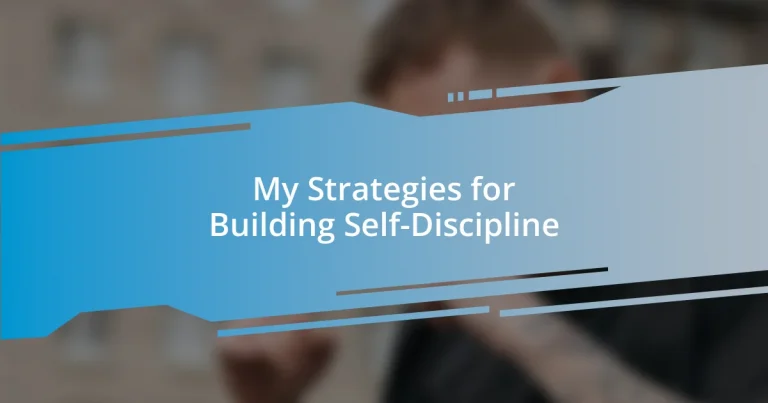Key takeaways:
- Self-discipline is about forming positive habits and creating structure rather than just resisting temptations.
- Setting clear, SMART goals enhances focus and motivation, making it easier to stay disciplined.
- Regularly tracking progress and celebrating small victories helps maintain motivation and resilience during challenges.
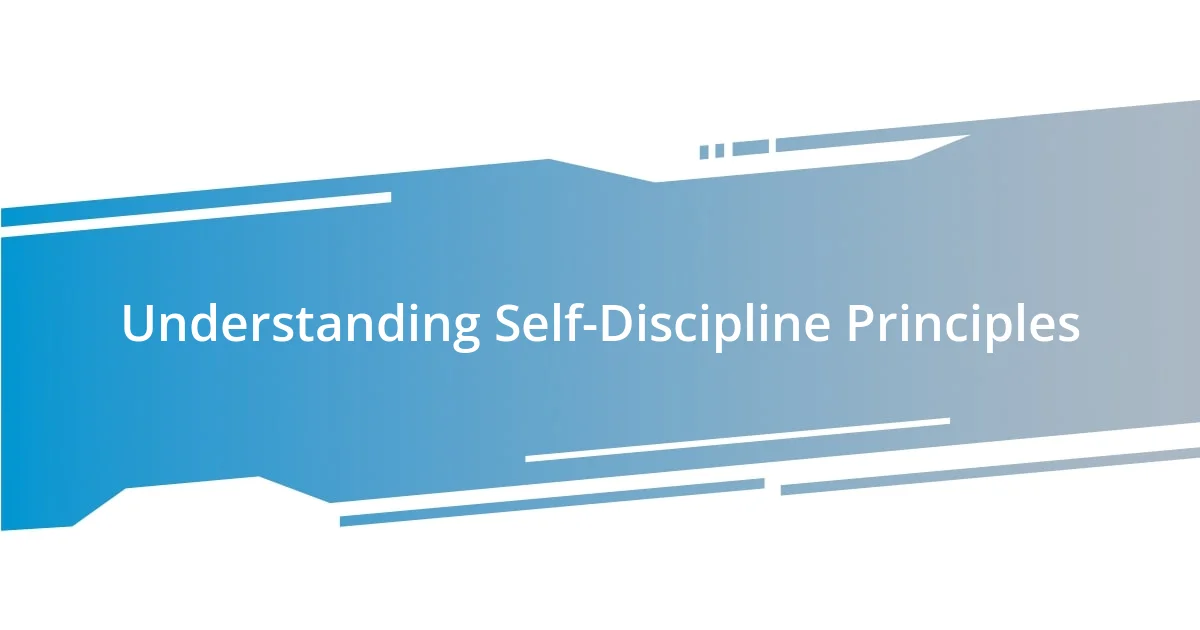
Understanding Self-Discipline Principles
Self-discipline is often misunderstood; it’s not just about saying “no” to temptations. In my early days of working toward discipline, I struggled with creating structure in my routine. I found myself asking, “Why is it so hard to stick to my goals?” It dawned on me that self-discipline is about forming positive habits that align with our values, not merely restricting ourselves.
One principle that resonates with me is the idea of incremental change. I remember when I decided to wake up just 10 minutes earlier each day to read. Initially, it felt slightly uncomfortable, but I gradually welcomed the change. This principle taught me that small steps can lead to significant progress, reminding me that discipline builds upon itself over time.
Another key aspect is self-awareness. I often reflect on my triggers—what distracts me or leads me astray. One evening, I found myself mindlessly scrolling through social media instead of working on my project. It hit me that recognizing these patterns empowers me to make better choices. How often do we overlook the subtle cues that influence our discipline? By tuning into myself, I’ve gradually honed my ability to stay focused on what truly matters.
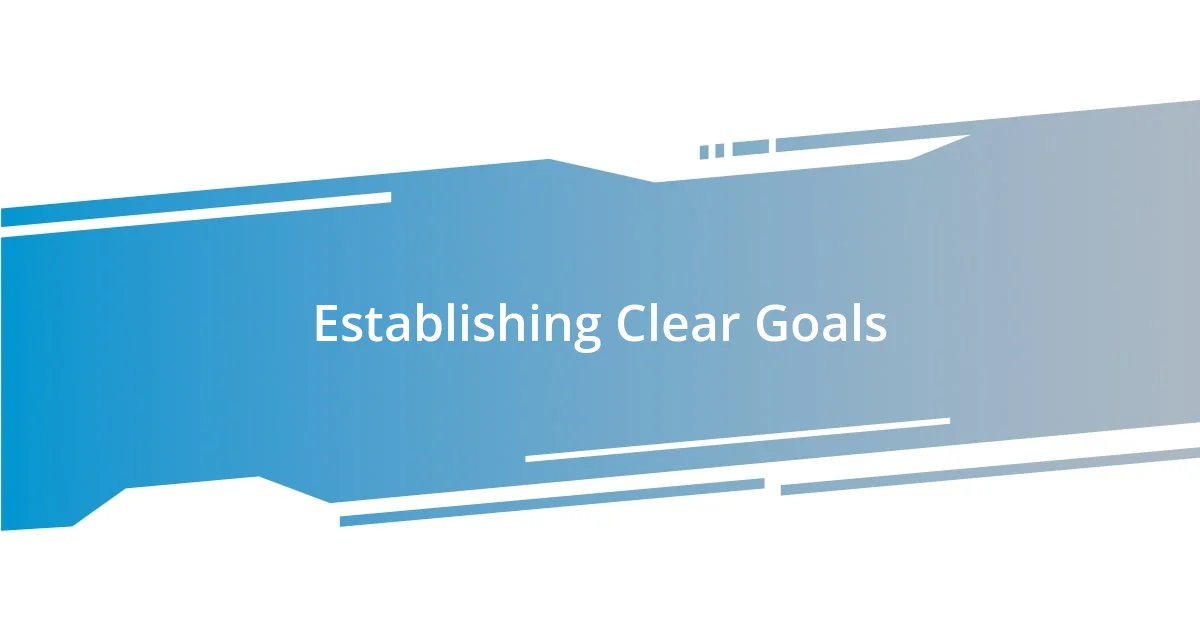
Establishing Clear Goals
Setting clear goals has been a game-changer in my journey toward self-discipline. In the past, I often floated from one task to another, feeling overwhelmed and lost. Then, I decided to jot down specific goals. This simple act transformed my focus and clarity. It’s like having a compass—you can see where you’re headed and take the right steps.
To ensure my goals are effective, I often break them down using the SMART criteria:
- Specific: Clearly define what you want to achieve. Instead of saying, “I want to be healthier,” I aim for “I will exercise for 30 minutes, five times a week.”
- Measurable: Identify how you will measure success. Tracking my workouts in a journal keeps me accountable.
- Achievable: Set realistic goals. I remember setting a lofty target to run a marathon without considering my current fitness level—it didn’t go well!
- Relevant: Ensure your goals align with your values. I focus on goals that resonate with my priorities and passions.
- Time-bound: Set a deadline. I find that giving myself a timeline creates urgency and motivates me to take action.
By being intentional about my goals, I feel more motivated, engaged, and, crucially, disciplined. Each time I check off a goal, I get a rush of satisfaction—like a little pat on the back that fuels my drive.

Creating a Structured Routine
Creating a structured routine has been pivotal for my self-discipline journey. I remember when I first started to implement a daily schedule. It felt like I was given a roadmap to navigate through my tasks. Each day has its own rhythm, and having set times for work, exercise, and rest not only keeps me organized but also helps maintain my mental clarity. Have you ever noticed how a well-planned day can skyrocket your productivity? It’s like a secret weapon in the battle against procrastination.
In my experience, consistency is key. I began by establishing a morning routine that includes activities like journaling, meditation, and planning my day. At first, it felt tedious, but over time, I felt more centered and less anxious. Now, even when I don’t feel like it, I power through that routine because I see how much it benefits me. It’s fascinating how the brain thrives on familiarity; by repeating these actions, I’ve created a mental framework that bolsters my self-discipline.
It’s also important to be flexible within that structure. Life throws unexpected challenges our way, and having a rigid routine can lead to frustration. I once had a week where everything went haywire — appointments got canceled, and I had to adapt on the spot. I learned that being willing to adjust my routine when necessary prevents stress and keeps me on track. The art lies in creating a structure that serves me while allowing for spontaneous moments. So, how do you ensure your routine is resilient yet effective?
| Aspect | Description |
|---|---|
| Morning Routine | Includes journaling, meditation, and planning for the day. |
| Consistency | Daily repetition helps reinforce habits and promotes mental clarity. |
| Flexibility | Adapting the routine as needed prevents stress and enhances effectiveness. |

Developing Healthy Habits
Developing healthy habits has been my safe harbor in the turbulent sea of distractions. I can still recall the moment I decided to incorporate small daily rituals into my life. Gradually, I turned mundane activities like drinking water and taking short walks into cherished habits. Have you ever realized how these small changes create a ripple effect? Each little commitment builds on the last, fostering a sense of accomplishment that’s hard to replicate elsewhere.
There’s also something incredibly rewarding about tracking my progress. For instance, I began logging my hydration and exercise in a simple app. Watching the numbers grow day by day is a little like watching a garden flourish; you put in the work, and the results start to show. This visual representation of my commitment helps me stay motivated, reminding me that I’m actively investing in my well-being. What methods do you use to keep track of your own healthy habits?
Lastly, I believe that community plays a crucial role in developing these habits. I remember joining a local running group, which not only pushed me to stay consistent but also filled my social cup. The energy from being surrounded by others with similar goals is contagious! There’s a sense of accountability—you don’t want to let your friends down, and that shared commitment gives each of us strength. If you were to find a buddy or group, what healthy habit would you tackle together?
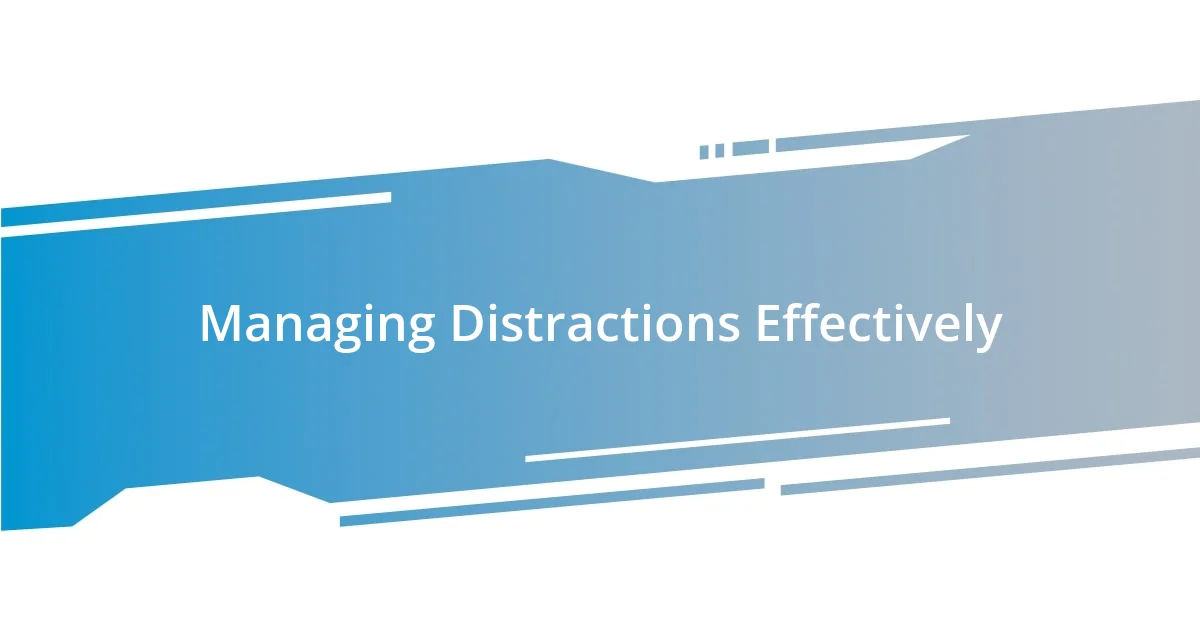
Managing Distractions Effectively
Managing distractions effectively is something I constantly refine in my life. One of my most successful strategies has been creating a distraction-free workspace. I vividly remember clearing out my desk and keeping only what I needed for my tasks. The difference was remarkable! It’s astonishing how a clutter-free environment can elevate focus. Have you ever noticed how less visual chaos can lead to a calmer mind? It’s almost as if a pristine workspace sends a signal to my brain: “Time to get to work.”
I also rely on technology to combat distractions. For instance, I’ve turned to focused music playlists and apps that limit notifications during my work hours. I still remember the first time I switched off social media alerts. Suddenly, I had the mental space to dive deep into my projects without constant interruptions. It felt liberating to take control of my attention. How do you use technology to guard your focus? It’s a game-changer when you harness it to support your goals.
Sometimes, the best strategy is simply recognizing when I need a break. I recall a day when I was knee-deep in work but found my mind wandering. Instead of pushing through, I allowed myself a moment to breathe and regroup. Taking a 5-minute pause to stretch or sip some water gave me a fresh perspective. It’s surprising how a short break can recharge your energy much more than grinding through. Have you tried this approach? Trust me, you’ll be amazed at how a little time away can lead to clearer thinking and renewed motivation.
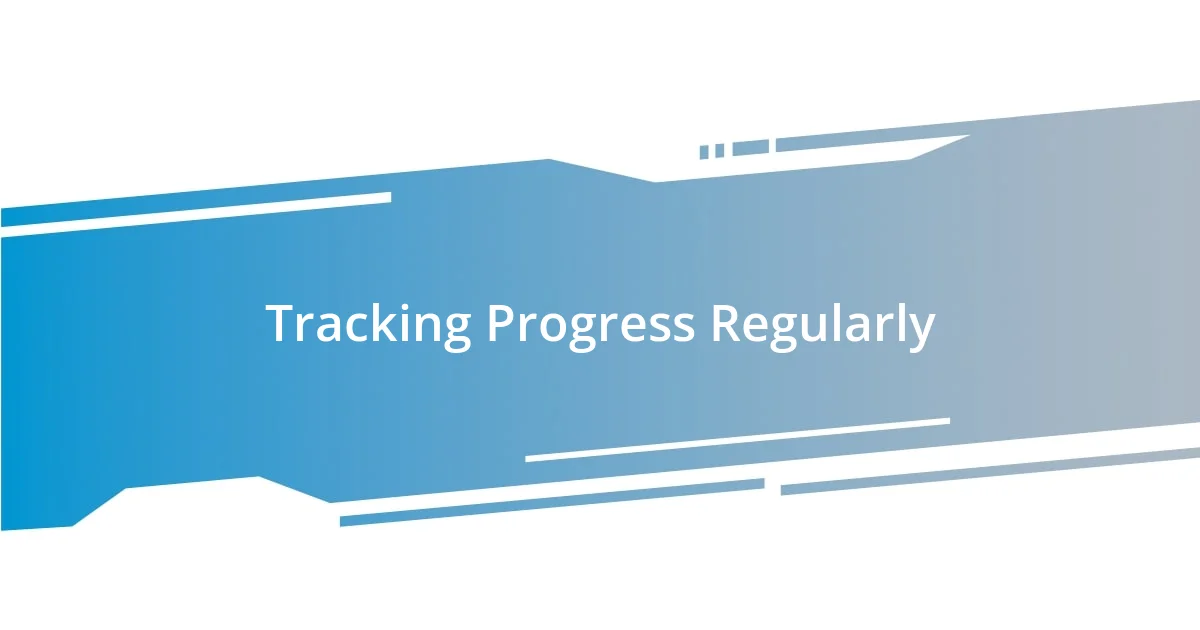
Tracking Progress Regularly
Tracking my progress regularly has become a cornerstone of my self-discipline journey. I started using a bullet journal, where I note down daily habits and goals. The satisfaction of crossing off completed tasks is oddly exhilarating; it’s a small win that fuels my motivation. Have you ever had that moment when a simple checkmark seemed to lift your spirits?
One practice I found incredibly effective was setting weekly reviews. During these sessions, I look back and assess what worked and what didn’t. Initially, I was apprehensive about confronting my shortcomings; however, I discovered that acknowledging setbacks is vital for growth. It’s as if I’m having a heart-to-heart with myself, understanding my patterns and making adjustments accordingly. Does that self-reflection resonate with you too?
I also enjoy using visual trackers, like habit graphs, to chart my progress. Watching my efforts translate into visible growth gives me a tangible sense of achievement. There’s something poetic about seeing a continuous line climb upward; it represents persistence and commitment. I often ask myself, “How can I make this progress even more meaningful?” Each data point tells a story of resilience, pushing me onward in my journey. Isn’t it inspiring to visualize your paths to success?
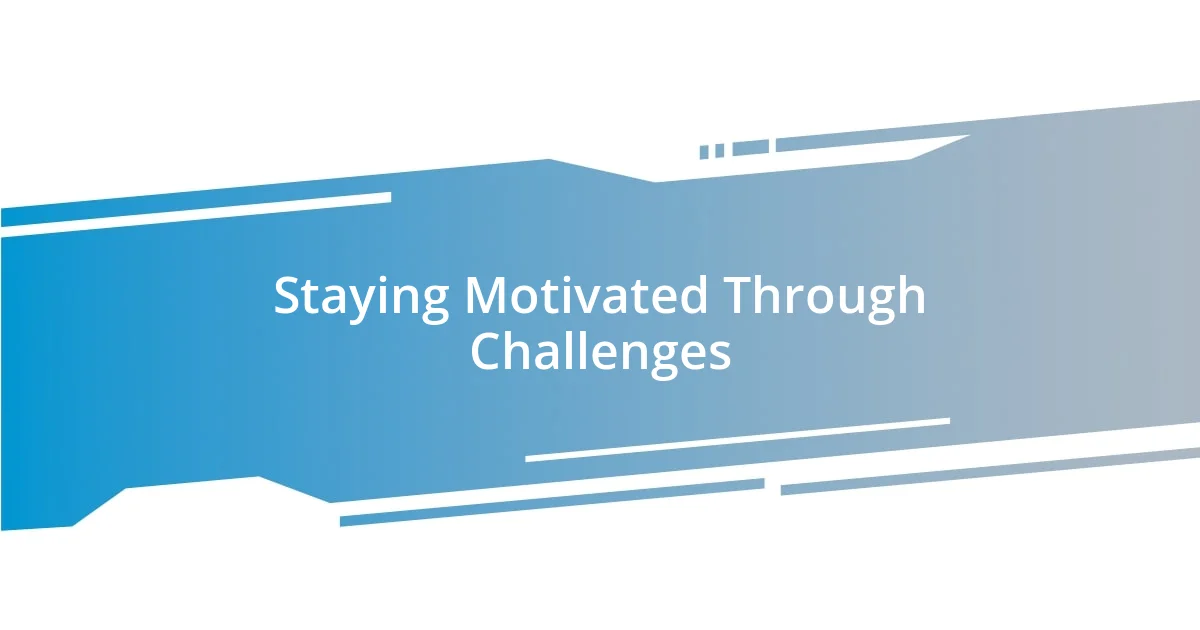
Staying Motivated Through Challenges
Staying motivated during challenges is something I continually navigate in my journey. There was a Sunday afternoon when I felt completely drained trying to meet a tight deadline. Instead of succumbing to frustration, I decided to break my tasks into smaller, manageable bites while reminding myself that each little achievement adds up. Have you ever felt overwhelmed by a big challenge? I’ve found that simplifying my approach keeps me grounded and focused even when things get tough.
Emotions can really influence our motivation levels, and I’ve learned to embrace them rather than suppress them. On a particularly challenging day, I felt a wave of self-doubt creep in. I took a moment to acknowledge that feeling instead of ignoring it; after all, everyone has their off days. I struggled but reminded myself that it’s perfectly normal to experience ups and downs on this journey. Have you ever found strength in vulnerability? It’s fascinating how acknowledging our emotions can actually give us a renewed sense of purpose to push through.
Celebrating small victories is another essential strategy that I oftentimes overlook in the heat of the moment. I vividly remember completing a challenging project and treating myself to my favorite coffee afterward. That little reward reminded me of the effort I put in, turning a daunting task into a rewarding experience. Don’t you think it’s vital to celebrate those smaller strides? I’ve realized that these moments of recognition can serve as powerful motivators when facing bigger challenges—after all, every step counts on the road to success.












